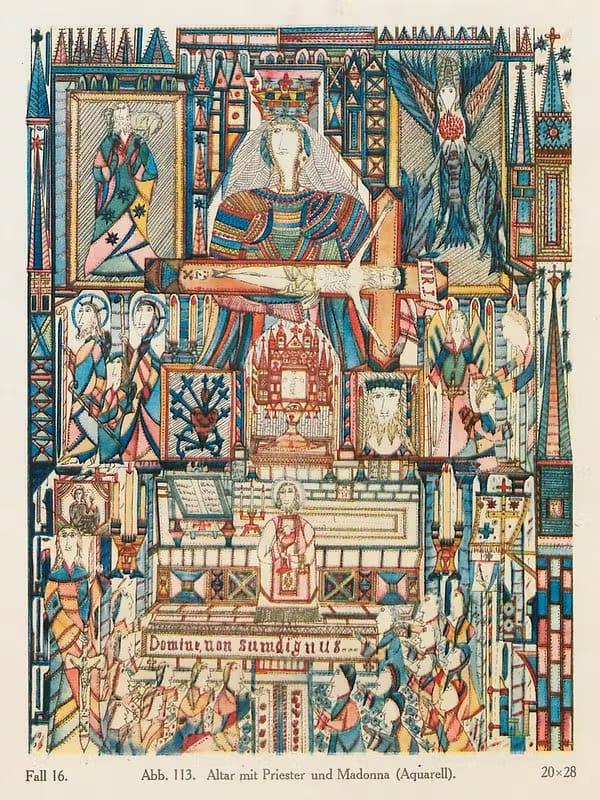Blogging Has Just Changed Forever and No One Is Talking About It
Blogging has recieved a major upgrade, from an unexpected place.

note: I highly recommend you click all the links in this piece.
The blog-o-sphere has been taking major L's on the Internet as of late. Bloggers have taken loss after loss to platforms like TikTok and Twitter, where producers have had the "pleasure" of competing for likes amongst the chaos of noise, where the lone individual yells until their lungs sting with pain in a vain attempt to be the tallest soapbox in the shampoo aisle.
For small indie bloggers that sought their 1000 true fans, the torch of hope seemed to be entering its dying light phase, quietly exiting stage left to an Internet run by a few large aggregation sites. There was just no cost effective way to have competitive advantage over an endless stream of algorithmically curated material, an IV drip feed of jump cuts and words.
And just as all hope seemed lost, a horn sounded in the distance. Our unexpected saviors had arrived. The cavalry was here.
Share Chats from ChatGPT. Yes, you heard me right. That thing that allows people to effectively screenshot chats with a machine learning model. Let me repeat that. Share Chats from ChatGPT.
Allow me to elaborate on why this is a huge deal.
Those Who Write Actually Think
If you've ever dabbled with the idea of taking writing as a craft seriously, you'll know that all writing (and I really do mean all: from drunk text messages to an ex all the way up to graduate level books on theoretical quantum physics) is composed of two steps: conjecture and error correction, or in layman's terms, the draft phase and the edit phase. Every writer has their preference and quirks: some only write in the mornings, some write on typewriters, some dictate to their Voice Memos app during their jogs.
But all writers think. All writers think new thoughts, and then tear away at the thoughts they created. All writers build and prune, build and prune, and build and prune, until you, dear reader, see a meticulously-engineered polished final piece of work, quieter than a hunting owl and smoother than a…uh…some really smooth thing.
The thing is, up until now, the final work was all the reader got to see and all the writer could manage. Blogging, even with it's unique ability to leverage hyperlinks out to research and other blogs, was largely a one dimensional effort.
Enter ChatGPT
Ok, so where does ChatGPT fit into this puzzle? How can it increase the value of a blog post for the reader and the writer? I'll tell you! ChatGPT is…drumroll please…
ChatGPT is frozen externalized cognition.
Whaaatt?? you might rightfully be thinking right now. How can we think outside our heads? And what does it mean to "freeze" cognition?
To answer this question, we need to examine the act of thinking in the two phases of conjecture and error correction above.
Conjecture
Conjecture is a fancy word for hypothesis which is a fancy word for educated guess which is a fancy term for cool idea that has a non zero chance of failure.
To make a new conjecture, one must be willing to trial multiple ideas and…well, see what sticks. Some ideas are good. Few ideas are really, really good. Most ideas are meh to bad.
The ideal conjecture phase is pure play. Don't set out to quell or snuff out any ideas, there are no bad ideas when the idea itself is to explore the space of ideas.
Conjecture lives mostly inside the mind, but that does not imply that conjecture only lives inside the mind. Think about the last time you were at a brainstorming session. Multiple minds were put to the task of solving one problem, but the thing is, all the participants have different backgrounds. Every person has their own set of priors, a fancy term for their own viewpoint built out of their unique experience and therefore show up to the table with a different offering to solve the shared problem.
Great, you may be saying, but if this is internal or done with a group, how does ChatGPT help?
In short, ChatGPT is a really, really good improv partner ("yes, and…"). Basically, thanks to RLHF training, the model will go along with any wacky idea you give to it -- it truly has zero preference about whether you want to opine on the best pizza place in Topeka, Kansas or discuss the finer points of the last Game of Thrones season. GPT. Will. Play.
Without judgement, you as a human can lead the Dance of Death as the instruments of your mind and ChatGPT play their frenetic tune into the rabbit hole of whatever the hell you please.
As an example, GPT in it's judgement free zone, can help you find words to express the idea you are looking to say.
Remember this from above?
And just as all hope seemed lost, the horn sounded in the distance. Our unexpected saviors had arrived. The cavalry was here.
Co-conjectured by me and ChatGPT.
Or this?
meticulously-engineered polished final piece of work
Or how about this from a second ago?
you as a human can lead the Dance of Death as the instruments of the mind play their frenetic tune into the rabbit hole of whatever the hell you please
The conjecture phase with Share chats is basically a thought process camera (take a snapshot) and resolution increaser (see the steps of the mental recipe). It clarifies your ideas, helps you play with more concepts to go even further, and freezes this "play" phase in time for your readers to see the foundational aspects of your argument.
Error Correction
This brings us to the second phase, the whittling away of the marble sketch we created in the conjecture phase, error correction.
If conjecture was exploring the space by opening all available doors, error correction is going around and slamming each one by one until only the fittest remain.
When we are editing, we are literally proclaiming our thoughts to the public. These thoughts are sent out into the wild to be upvoted and downvoted, shared, mulled over, and eviscerated in comment boards.
The process of editing is baked into the reality we (you, me, the neighbors' dog, Canada, an oak tree, a pod of whales,…) share. All writers have a duty to translate the goings-on in their minds as faithfully as possible to an external audience of readers. And thus writers edit. Writers hire teams of publishers to bleed over word choice, to fight to cut entire paragraphs from a piece, to destroy the tower but leave the base intact. And stronger.
GPT serves as a great editor. Looking for a different way to say something? How about multiple ways to say something with pros/cons in tabular format?
No problem.
The edit phase is about tradeoffs. Cutting some ideas in favor of others. Choosing one phrase instead of another since it is likely to be understood by the target audience. But no idea, no theory -- is perfect. In fact, some ideas might be in direct conflict with each other and both remain true, and until now, there was be no way for the reader to divine this from the final edited work without a ton of caveats plainly stated by the writer. Share Chats allow the reader to see the edit choices made by the writer.
Editing also got a major, major upgrade.
Conclusion
OpenAI just released share chats, allowing readers to get a insanely powerful look into the thought process of the writer and allowing the writer to increase the value of their blogs for little to no extra work.
This makes blogging, thanks to it's core technology of hypertext, now multi-dimensional in nature, where the thought process of the blogger can be frozen as literal threads for the reader to dive into. This is a huge win for blogging, and aggregators have not caught up to the value add of this yet.
Forget chain of thought language model prompting, hello chain of thought blogging!
Other Examples You Might Want to Try
- finding the right word that fits the flow of your piece better
- coining a creative turn of phrase or trying to teach a new concept
- summarizing something into simpler conceptual terminology
- arguing about pros and cons
- simulating audience questions or comments
- "invoking" the style of writer's you look up to to emulate
- creating a "writers table" to edit your work in third person
And these are just off the top of my head.
One Last Thing
Hugely, and I mean hugely, these share chats are also templates. What does this mean? This means a reader gets to continue the writers thought process with their own cognitive understanding and background. They get to take the writer's seeds of thoughts, and recompose them in their own garden, like taking a lemon from your neighbors prolific lemon tree to plant in your own backyard.
It’s like an MMO for blogging between the reader the writer and the LLM, I can’t overstate the importance of this.
P.S I Lied, There's Something Else. Something Big
Blogging isn't the only work product that has been quietly disrupted by Share Chats. Interested in learning about this? Sign up for the newsletter to be informed of when it drops!
Hint(!):
You now get a front row seat into the mind of the coder, and since GPT/copilot is writing all out code anyway these days, you get to see the libraries it prefers to reference, and how to move towards or away from these imports.
No longer do you have to guess what some previous incarnation of the Avatar some software developer was LARPing as, you can literally see their thought process.
bramadams.dev is a reader-supported published Zettelkasten. Both free and paid subscriptions are available. If you want to support my work, the best way is by taking out a paid subscription.




